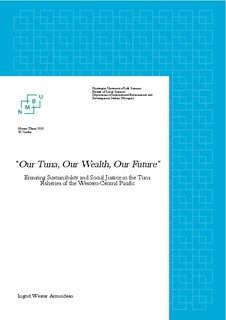| dc.description.abstract | Several species targeted by global fisheries have suffered declines due to increased fishing efforts and more sophisticated fishing technology since the late 1980s. The Food and Agriculture Organization (FAO) of the United Nations estimates that 30% of global tuna stocks are overexploited or depleted and that 53% are fully exploited. In the Pacific Ocean, one of the last global refuges of healthy tuna stocks remains. More than 70% of the tuna consumed globally is caught here – and for decades, stocks of tuna have seemed inexhaustible. However, certain stocks are under pressure from fishing practices ranging from sustainable and well- governed ones, to fishing methods that are ecologically and ethically harmful, unsustainable and at times illegal. Determining whether a fishery is operating on sustainable terms is challenging. The ability to include multiple variables in assessing the sustainability of a fishery system represents a new school of thought within fisheries sciences. Key challenges in fisheries management today involve issues of overcapacity, perverse subsidies, perverse economics, poor governance, lack of data, climate change, unemployment or the issues of by-catch and discards. The challenges are interlinked and undermine the possibility of achieving sustainability if a holistic, ecosystem-based management is not implemented.
This research has attempted a sustainability assessment of the skipjack and yellowfin tuna fisheries of the Western-Central Pacific Ocean (WCPO), with focus on the fishing methods purse-seine (PS) and pole-and-line (PNL). It illuminated the fishery through a case study of a fishing company in Solomon Islands, with qualitative data collected through semi-structured interviews of fishers and key informants from tuna management agencies performed in Suva, Fiji, Honiara and Noro, Solomon Islands, in April-May 2015. The qualitative data was analysed in a semi-quantitative manner, combined with secondary literature and document analysis using Elinor Ostrom’s Social-Ecological Systems (SES) framework as an analytical tool.
The key results of the analysis suggest that the yellowfin tuna stocks of the WCPO are showing slight signs of growth overfishing. It suggests that skipjack stocks in the same area are currently not under overfishing threats, however, their future sustainability will depend on improved policies and implementing more conservational efforts in the stock management. These findings were corroborated by local fishers, who confirmed that current tuna stocks have changed during the past three decades, and that declines of fish stocks have been noticed. In particular, the fishing pressure from Distant-Water Fishing Nations (DWFNs) and increased issuing of fishing licence to PS fishing vessels, were worrying to these informants.
This study concludes that ensuring sustainability in the WCPO could be enhanced by decreasing PS vessels fishing with FADs, and providing benefits to PS fishers shifting to free school fishing. It would seem beneficial to encourage a partial shift to more PNL vessels, as this fishing method secures biological, socioeconomic and employment sustainability. The sustainability issues of the bait fishery are recognized, and further research towards improved management would be advisable to ensure healthy stocks.
Finally, the current momentum of Pacific regionalism through the strengthening of the Pacific Islands’ solidarity and cooperation are recognised as key factors contributing to social and ecological sustainability, and towards securing their wealth derived from tuna resources. | nb_NO |

